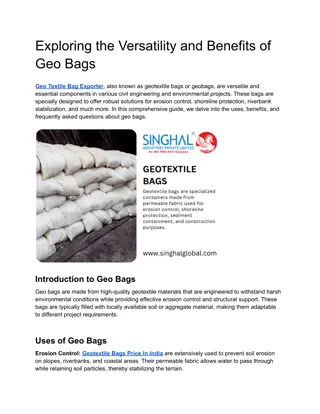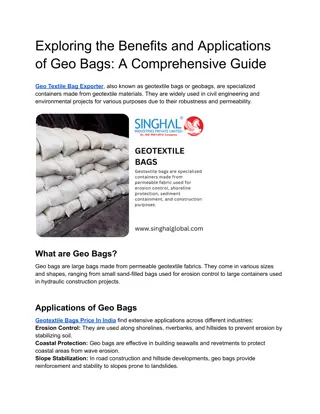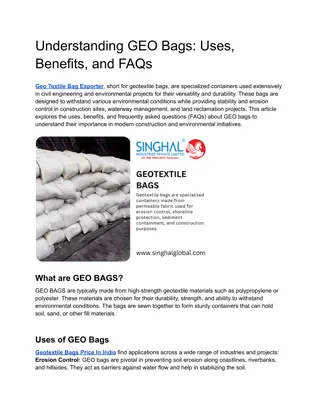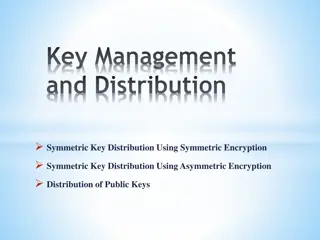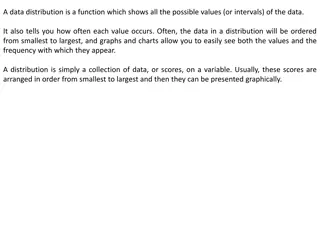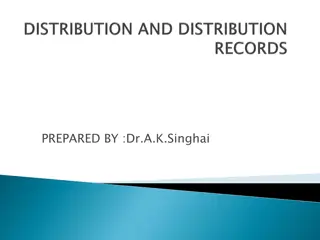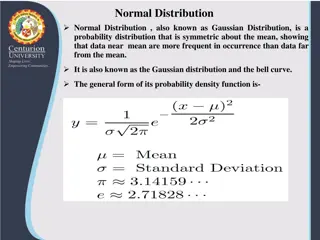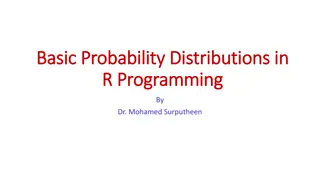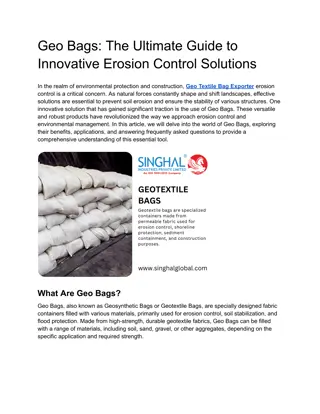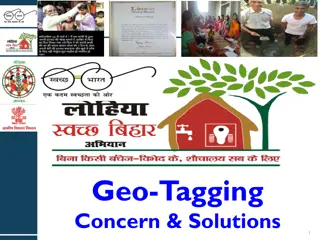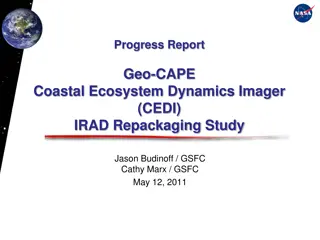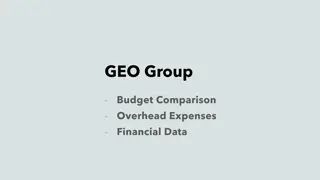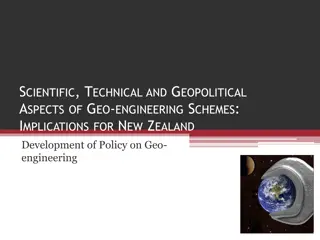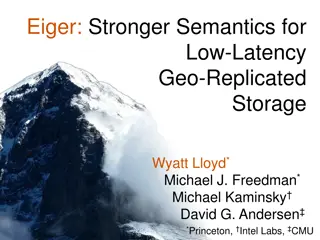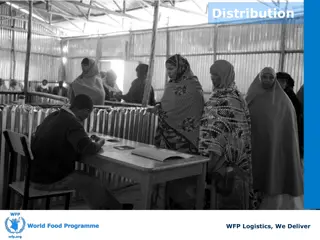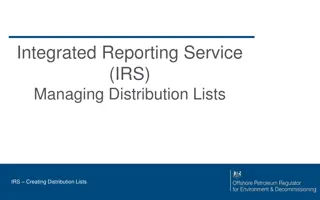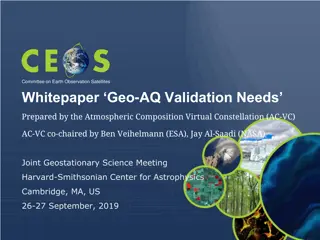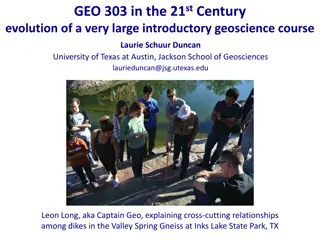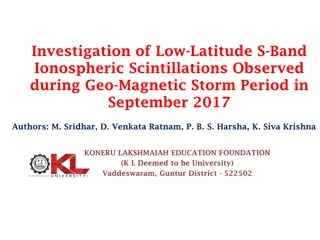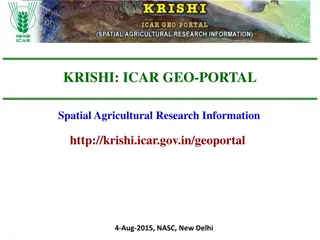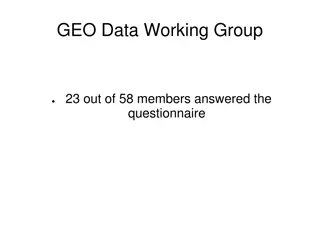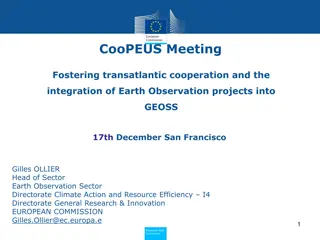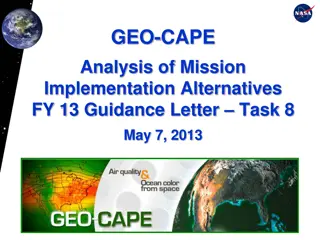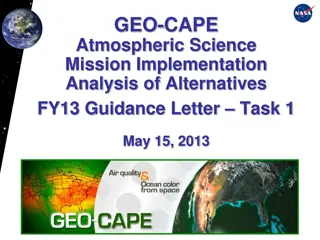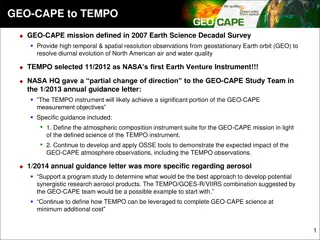Physical Distribution
Physical distribution is a critical aspect of business operations involving the planning, implementation, and control of the flow of goods from origin to consumer. Philip Kotler and William J. Stanton have defined physical distribution as a process of managing the movement of goods to meet consumer
0 views • 8 slides
Effective Management of Transportation and Distribution in the Supply Chain
Understanding the methods to optimize the supply chain through inventory management, basic functions of transportation and distribution management, distribution strategies, importance of creating visibility in transportation and distribution activities, and the role of technology in enhancing operat
6 views • 27 slides
Maximizing Efficiency with Geo Bags
From erosion control and slope stabilization to flood protection and land reclamation, Geotextile bags manufacturer offer numerous benefits for infrastructure projects and environmental management initiatives. In this blog, we'll explore how to maximize efficiency with geo bags through thoughtful de
21 views • 4 slides
Global Energy Dynamics: Oil Prices, Geo-politics, and Economic Shifts
Explore the interplay between oil prices, geo-politics, and the global economy in a new paradigm. Key themes include the dominance of fossil fuels, challenges in transitioning to renewables, and the impact of geopolitical events on energy markets. Dive into discussions on the Ukraine war's effects,
4 views • 36 slides
Geo Textile Bag Exporter
At Singhal Industries, we are proud to be your premier Geo Textile Bag exporter, delivering unmatched quality and reliability. Our Geo Textile Bags are engineered to meet diverse industrial needs, ensuring superior strength, durability, and environme
3 views • 3 slides
Geo Textile Bag Exporter
In the realm of geo textile solutions, choosing the right exporter is paramount for project success. Our company stands out as a premier exporter of geo textile bags, offering a diverse range crafted with high-grade materials for durability and envir
0 views • 2 slides
Leading Geo Textile Bag Exporter for Your Global Needs
As a prominent Geo Textile Bag exporter, we specialize in delivering high-quality solutions tailored to global infrastructure projects. Our bags are crafted with precision using advanced materials, ensuring durability and reliability in diverse envir
3 views • 3 slides
Premium Geo Textile Bag Exporter: Quality You Can Trust
As a leading Geo Textile Bag exporter, we pride ourselves on delivering top-notch products that meet international standards. Our Geo Textile Bags are engineered for durability, environmental sustainability, and superior performance in various applic
4 views • 3 slides
Reliable Geo Textile Bag Exporter: Your Trusted Partner
Looking for a dependable Geo Textile Bag exporter? Our company stands out with its commitment to quality and reliability. We specialize in providing high-grade Geo Textile Bags that cater to various industries, ensuring durability and efficiency in e
3 views • 3 slides
Evolution of Data Processing Systems in Geographic Information Science
Data processing systems in Geographic Information Science have evolved from manual, analogue methods to advanced software and hardware components. The incorporation of Geographic Information Systems (GIS) has revolutionized the handling and analysis of geo-referenced data, making tasks like data cap
0 views • 20 slides
Understanding Multinomial Distribution in Statistical Analysis
Multinomial Distribution is a powerful tool used in statistical analysis to model outcomes of events with multiple categories. This distribution is applied to scenarios where each trial has several possible outcomes, and the sum of probabilities of all outcomes is equal to 1. By defining random vari
0 views • 8 slides
Key Management and Distribution Techniques in Cryptography
In the realm of cryptography, effective key management and distribution are crucial for secure data exchange. This involves methods such as symmetric key distribution using symmetric or asymmetric encryption, as well as the distribution of public keys. The process typically includes establishing uni
1 views • 27 slides
Understanding Data Distribution and Normal Distribution
A data distribution represents values and frequencies in ordered data. The normal distribution is bell-shaped, symmetrical, and represents probabilities in a continuous manner. It's characterized by features like a single peak, symmetry around the mean, and standard deviation. The uniform distributi
1 views • 23 slides
Drug Product Distribution Procedures and Records
Written procedures and distribution records are crucial for the efficient distribution of drug products. Procedures should prioritize the distribution of the oldest approved stock first and enable easy recall if necessary. Distribution records must be maintained and indexed for accountability. Diffe
0 views • 10 slides
Understanding Normal Distribution and Its Business Applications
Normal distribution, also known as Gaussian distribution, is a symmetric probability distribution where data near the mean are more common. It is crucial in statistics as it fits various natural phenomena. This distribution is symmetric around the mean, with equal mean, median, and mode, and denser
1 views • 8 slides
Understanding Binomial Distribution in R Programming
Probability distributions play a crucial role in data analysis, with the binomial distribution being a key one in R. This distribution helps describe the number of successes in a fixed number of trials with two possible outcomes. Learn about the properties, probability computations, mean, variance,
3 views • 30 slides
Geo Textile Bag Exporter
Geo Bags are essential for environmental protection and erosion control. Made from high-quality geotextile materials, these robust bags are filled with sand or soil and placed strategically to prevent soil erosion, stabilize shorelines, and protect a
2 views • 3 slides
Guidelines and Solutions for Geo-Tagging Concerns in Rural Development
Explore essential information and solutions related to geo-tagging in rural development projects. Learn about manpower allocation, latitude/longitude issues, offline processes, beneficiary identification challenges, and incentive payments for geo-taggers.
0 views • 7 slides
- Geo-CAPE Coastal Ecosystem Dynamics Imager (CEDI) IRAD Repackaging Study
- The Geo-CAPE Coastal Ecosystem Dynamics Imager (CEDI) is undergoing a repackaging study to reduce its volume for compatibility with various missions. The study aims to define a scientifically viable mission by evaluating architecture and packaging trades. It compares the volume of the Geo-CEDI to
0 views • 13 slides
Financial Overview of GEO Group: Compensation, Taxes, and Contributions
Detailed financial data related to GEO Group, including executive compensation, correctional officer pay, domestic income taxes paid, political contributions, and federal lobbying expenses over the years 2017-2020 are presented. The figures provide insights into the financial aspects of the organiza
1 views • 19 slides
Air Quality Policies and Science Challenges in GEO-CAPE Horizon
The policies in play during the GEO-CAPE Horizon encompass a range of Clean Power Plans, NAAQS requirements, emissions controls for vehicles, air toxics reduction strategies, and more. Science challenges include emissions quantification, atmospheric composition analysis, air quality and climate link
0 views • 4 slides
Implications of Geo-Engineering Schemes for New Zealand: Policy Development
Exploring the scientific, technical, and geopolitical aspects of geo-engineering schemes and their implications for New Zealand's policy development. Discusses the current legal and policy constraints, international regulations, and the future of regulating geo-engineering technologies in the contex
0 views • 15 slides
Understanding Chi-Square and F-Distributions in Statistics
Diving into the world of statistical distributions, this content explores the chi-square distribution and its relationship with the normal distribution. It delves into how the chi-square distribution is related to the sampling distribution of variance, examines the F-distribution, and explains key c
0 views • 23 slides
Ethical Communication of Environmental Impacts in Geo-Related Projects
Exploring the ethical aspects of communicating potential environmental impacts of industrial projects, particularly in the context of new geo-related projects requiring public input. Geoscientists play a pivotal role in enhancing public understanding by addressing key questions and ethical considera
0 views • 17 slides
Stronger Semantics for Low-Latency Geo-Replicated Storage
Discusses the importance of strong consistency and low latency in geo-replicated storage systems for improving user experience and revenue. Various storage dimensions, sharding techniques, and consistency models like Causal+ are explored. The Eiger system is highlighted for ensuring low latency by k
0 views • 24 slides
Comprehensive Lesson on Distribution Planning and Setup
This detailed lesson plan covers essential aspects of distribution systems, planning, setups, layouts, and actors involved in the distribution cycle. Participants will learn about distribution types, considerations, and evaluation criteria to ensure successful distribution operations. The session in
0 views • 22 slides
Managing Distribution Lists in Integrated Reporting Service (IRS)
Integrated Reporting Service (IRS) allows users with Notification Submitter privileges to create distribution lists to inform interested parties about notifications submitted. Creating distribution lists saves time by eliminating the need to repeatedly enter email addresses, ensuring all relevant pa
0 views • 5 slides
Actor-Based Services: Geo-Distribution Challenges and Solutions
Explore the complexities of geo-distributing actor-based services, handling multiple users, devices, data centers, and concurrent code execution. Delve into client app architecture, challenges of correctness under failures, and the quest for the right abstractions in composed services. Discover stra
0 views • 54 slides
Geo-AQ Validation Needs Whitepaper: Enhancing Space-based Observation Capabilities for Earth's Atmosphere
Elaborating on the validation needs of the Geo-AQ Constellation, this whitepaper focuses on new challenges in geostationary atmospheric composition missions. It aims to enhance mission success by establishing inter-mission consistency targets and monitoring product accuracy. The document identifies
0 views • 11 slides
Evolution of GEO 303: A Large Geoscience Course in the 21st Century
Evolution and success of GEO 303, a large introductory geoscience course at the University of Texas at Austin. The course blends physical and historical geology, challenges students' pre-conceived notions, and encourages them to think like geologists. Team teaching, innovative instructional methods,
0 views • 8 slides
Investigation of Low-Latitude S-Band Ionospheric Scintillations during September 2017 Geo-Magnetic Storm
The study focuses on analyzing the impact of geo-magnetic storms on NAVIC satellites, particularly the S-band signal, during September 2017. Researchers from K.L. Deemed to be University observed variations in solar and geomagnetic activity indices, providing insights into the behavior of the ionosp
0 views • 15 slides
Job Scheduling Across Geo-distributed Datacenters
Scheduling jobs across geo-distributed datacenters poses challenges such as optimizing job completion time, reducing data transfer costs, and coordinating tasks across multiple locations. Various strategies like reordering-based approaches and scheduling heuristics are explored to enhance job schedu
0 views • 32 slides
ICAR KRISHI Geo-Portal: Spatial Agricultural Research Information
ICAR KRISHI Geo-Portal is a digital platform aiming to facilitate spatial agricultural data generation, compilation, visualization, and analysis. It hosts spatial databases, provides map services, and allows data sharing across platforms. The portal, developed using open-source technologies, offers
1 views • 32 slides
Insights into GEO Data Working Group Dynamics and Objectives
An overview of the GEO Data Working Group activities, including participation statistics, self-nominations for co-chairs, sub-group focuses, and logistical details. The group aims to enhance data sharing, promote interoperability, and address legal and ethical issues related to data management. Disc
0 views • 8 slides
Fostering Transatlantic Cooperation in Earth Observation Projects through GEOSS
Meeting held in San Francisco discussing the integration of Earth Observation projects into GEOSS, highlighting the importance of GEO and collaboration between the US and EU. Examples include global initiatives like GFOI, GMOS, and GEO BON. Emphasis on the Water Community of Practice and the assessm
0 views • 12 slides
MGA and Geo Unit Business Finances Overview
This document provides a detailed overview of the business finances concerning MGA and Geo Units. It covers topics such as the flow of funds to Geo Units, allocation models, reserves, spending rules, surplus processes, member dues distribution, and more. The information includes financial data, rule
0 views • 18 slides
SEO Vs GEO How do they Impact Business
Compare SEO and GEO to see how each affects your online business. Learn which strategy works best for improving your online presence.
0 views • 10 slides
Overview of GEO-CAPE Mission Implementation Analysis
The GEO-CAPE mission implementation analysis for FY 13 involved assessing instrument and mission risks, focusing on the impact of the TEMPO instrument on atmospheric science capabilities. Recommendations were made to update the instrument suite to align with evolving requirements. Risks were categor
0 views • 5 slides
Analysis of GEO-CAPE Atmospheric Science Mission Alternatives
The Geostationary Coastal and Air Pollution Events (GEO-CAPE) mission aims to measure atmospheric composition and ocean color. The impact of the Tropospheric Emissions Monitoring of Pollution (TEMPO) instrument on GEO-CAPE planning is acknowledged, with a need to adjust GEO-CAPE activities. An analy
0 views • 20 slides
Evolution of GEO-CAPE: Leveraging TEMPO for Atmospheric Observations
The GEO-CAPE mission, defined in the Earth Science Decadal Survey of 2007, aims to provide high-resolution observations from geostationary Earth orbit to monitor North American air and water quality. NASA's TEMPO instrument, selected in November 2012, plays a crucial role in achieving GEO-CAPE's obj
0 views • 5 slides




